Argentina
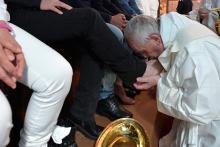
"We are all sinners. We all have defects," the pope told the inmates, in an improvised sermon broadcast by Vatican Radio.
By washing their feet, Francis told them, he was willing to do "the work of a slave in order to sow love among us". He urged them to help each other.
Two of the 12 are serving life sentences, and the others are due to be released between 2019 and 2073.
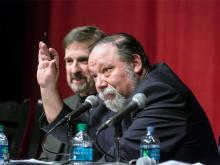
For Catholics, the key to working collaboratively with Pope Francis, on issues from mass migration to climate change to Hispanic evangelization, may be found in a controversial movement that many left for dead long ago: liberation theology.
That message reverberated, from Feb. 6 to Feb. 10, through the halls of Boston College and a nearby retreat center, as nearly 40 theologians gathered from across the Spanish-speaking world to discuss the movement’s future with its founding figures.
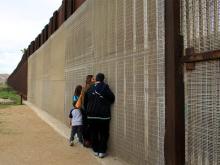
President Trump’s proposed border wall with Mexico raises serious questions about America’s moral standing, as the poor would bear the brunt of the suffering, a leading Catholic theologian says.
The Rev. Daniel G. Groody, an associate professor of theology at Notre Dame University in Indiana, said the wall would lead to a loss of life, as migrants are forced to find other ways to escape poverty across the border.
“What Trump fails to see is that state sovereignty is not an absolute privilege, but a moral responsibility,” said Groody.
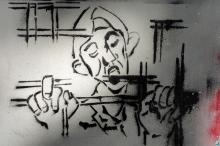
Many have accused the Catholic Church of being complicit in the government-sanctioned violence, and the Argentinian Pope Francis has been criticized for being silent in the face of such atrocity. But today’s statement says the decision to release the archives came at the pope’s direction.
The move is noteworthy, given that many of the records would traditionally never be made public, while others would not typically be released for decades. The break with tradition, according to the statement, comes “in the service of truth, justice and peace.”

The 55-year-old Maradona is regarded as one of the greatest players of all time and is joining some of the world’s other top players, including Brazilians Ronaldinho and Felipe Anderson as well as Italian player Francesco Totti, at the pope’s benefit soccer match to be held in Rome on Oct. 12.
“I am with Pope Francis, for him I am always available,” Maradona told a news conference this week.
3. Standing Rock Sioux Bring Pipeline Protest to D.C.
WATCH: Images from the protest and interview with speaker Mark Charles.
4. The Stanford Rape Case Judge Steps Aside
The California judge who sentenced Brock Turner to only six months after a three-count sexual assault conviction has voluntarily stepped aside and is transferring to the civil division.
5. Priests vs. Drug Lords in Argentina
“It’s part of a bigger problem,” Padre Isasmendi says. “It’s part of marginalization.”
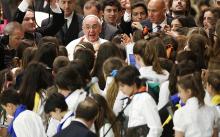
Figuring out why Pope Francis has upended so many expectations and what he might be contemplating for the future of the Catholic Church has become a parlor game almost as popular as the pontiff himself.
A single key can unlock these questions: Francis’ long-standing identity as a Jesuit priest.
It’s an all-encompassing personal and professional definition that the former Cardinal Jorge Bergoglio brought with him from Buenos Aires, and one that continues to shape almost everything he does as pope — even though he is the first pontiff to take his name from the 13th century Italian monk from Assisi who was famous for living with the poor and preaching to the animals.
“He may act like a Franciscan but he thinks like a Jesuit,” quipped the Rev. Thomas Reese, a fellow Jesuit who is a columnist for National Catholic Reporter.
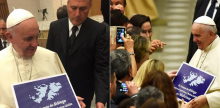
Francis’ inadvertent gesture of support for renewed talks between the two countries inevitably caused a stir in his home city, Buenos Aires, with Argentine President Cristina Kirchner posting the pope photograph on Twitter. So too did Argentina’s foreign ministry, writing: “Pope Francis receives the Argentina-UK pro-dialogue message.”
But the Vatican played down the significance of the moment, saying the pope had no idea what was written on the sign. “The Holy Father did not even realize he had taken this object in his hands. He has discovered this just now after seeing the photograph,” the Vatican said in a statement.
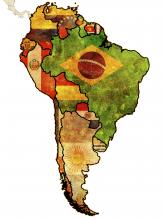
JON SOBRINO LAUGHS ever so slightly at my question. His office in the Monseñor Romero Center in San Salvador is a paper cavern, a place where a theological archeologist digging to understand the highs and the lows of liberation movements within the church would find a mother lode of artifacts.
Where is liberation theology going from here under Pope Francis? Sobrino, perhaps one of the most prolific liberation theologians, is thin and thoughtful. He considers his words: Liberation theology is a way of thinking about how a Christian must live—in active, engaged struggle for the flourishing of all life. Liberation is the primary movement of the Holy Spirit. It is the duty of those baptized into the life, death, and ministry of Jesus Christ to live this out, immediately and urgently.
In March 2013, when Argentine Cardinal Jorge Mario Bergoglio, Sobrino’s fellow Jesuit, became pope, liberation theologians and practitioners took a deep collective breath—what would happen next?
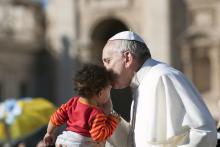
JOURNALIST Elisabetta Piqué was reporting for Argentina’s La Nacion from a conflict zone in Gaza when her phone rang. On the line was her friend, Padre Jorge. He knew Piqué, a war correspondent, was somewhere bombs were falling. He wanted to pray with her.
Piqué had known Argentina’s Catholic Cardinal Jorge Bergoglio since 2001. “He knew me first as a war correspondent,” Piqué told me when we met on a warm October afternoon in the courtyard of Hotel Helix in Washington, D.C. An affectionate friendship developed. Bergoglio even baptized her two children. Her new book, Pope Francis: Life and Revolution, investigates the history, passions, mistakes, humility, courage, and spiritual maturity of the man her friend has become.
In the rush to publish biographies of the new pope, some (see Paul Vallely’s Pope Francis: Untying the Knots) tout Bergoglio’s conversion from careful, benevolent, autocrat to radical, somewhat careless, lover of the poor. Piqué categorically challenges this portrayal. “He is a person who has been consistent all his life,” she says, “not somebody that suddenly became like that now. The theories that he had a conversion are totally nonsense and without any basis. He was always a sensitive person toward suffering.”

Addressing journalists on his return from his intense five-day visit to South Korea late August 18, Pope Francis bantered with reporters and lightheartedly said he may only have “two or three” years left to live.
The 77-year-old pontiff covered a range of topics on the flight back to the Vatican—from war-torn Iraq and his desire to visit the U.S. next year to his personal health, hinting he may retire early.
He was asked how he lived with the immense popularity he has generated around the world, evident when crowds chanted his name on the streets of Rio de Janeiro during his first official visit to Brazil last year.
“I try to think of my sins, my mistakes, so as not to think that I am somebody,” he said. “Because I know this will last a short time, two or three years, and then (go) to the house of the Father,” he said during an in-flight media conference.

Are the media pulling their punches when it comes to Pope Francis?
Whether it’s because he carries his own bags or cold-calls troubled Catholics who write to him, or because he so clearly loves interacting with crowds or drives a beat-up Renault around the Vatican, it’s hard to tell. But at some point, much of the world’s media fell for the new pope.
Now an increasing number of Vatican insiders are asking whether the largely positive view of Francis affects the way the media cover the Holy See.
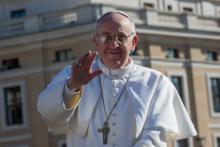
Since the moment of his election on March 13, Pope Francis has been warmly embraced by his own flock and even the media and the wider public in a way his bookish predecessor, Benedict XVI, was not.
Such an effusive welcome is especially good news for Catholic leaders who spent years fending off criticism of Vatican dysfunction under Benedict and a cloud of scandal and crisis at home. And the hot start for Francis is also crucial in building up a reservoir of good will that will be needed when the new pope refuses to bend on unpopular teachings or commits a gaffe of his own. Polls show that anywhere from 73 percent to 88 percent of American Catholics say they are happy with the selection of Francis, as opposed to about 60 percent who were happy with the choice of Benedict — and many of those are extremely pleased with the new pope.
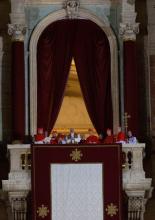
Jews worldwide welcomed newly elected Pope Francis as a friend on Wednesday, and pointed in particular to his sympathetic and strong reaction to the 1994 bombing of a Jewish center in his native Argentina — the deadliest bombing in the country’s history.
As Cardinal Jorge Mario Bergoglio, the archbishop of Buenos Aires, Francis “has had a warm relationship with the Jewish community of Argentina, and enjoyed close friendships with many prominent rabbis,” said Rabbi David Rosen, international director of interreligious affairs at the American Jewish Committee. “As far as I have heard and read in the few minutes since he was elected pope, he has shown deep signs of respect and friendship towards the Jews,” said Riccardo Di Segni, the chief rabbi of Rome. “It’s a good starting point.”
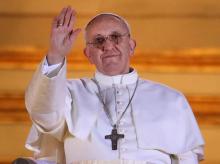
Francis. Pope Francis. This could be good news for the Catholic Church, for the whole church, and for the world. Let’s hope and pray so.
Jorge Bergoglio, the Argentinian cardinal from Buenos Aires, will be the first pope from Latin America and the first outside of Europe in a millennium. That’s good news from the start. And the world is now learning about the 76-year-old new pontiff whose election caused the white smoke to rise in the night skies of Rome to the cheers of tens of thousands of people in St. Peter’s Square. A Jesuit scholar, he seems to be a humble man who lives simply, choosing to live in a small apartment instead of the archbishop’s palace, and travel on buses and trams instead of in the church limousine.
Will simplicity and social justice become the witness of the Roman Catholic Church around the world — and will it emanate from the first pope from the Global South, which is clearly the growing future of the church? What good news that would be.
